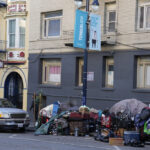

California cities are responding to the Supreme Court taking on the legality of homeless encampment sweeps, poised to affect San Francisco, where officials are engaged in a yearslong legal battle over the matter.
Last week, the Supreme Court decided to weigh in on whether homeless people can camp on public property if no shelter is provided — the case is expected to be heard by the highest court later this year.
The case, originating from Grants Pass, Oregon, could have major implications on California — a state that has spent over $20 billion since 2019 to get people off the street, according to the Legislative Analyst’s Office.
“California has invested billions to address homelessness, but rulings from the bench have tied the hands of state and local governments to address this issue,” Newsom said in a Jan. 12 statement. “The Supreme Court can now correct course and end the costly delays from lawsuits that have plagued our efforts to clear encampments and deliver services to those in need.”
While a multiyear $750 million push by Gov. Gavin Newsom (D-CA) — dubbed the Encampment Resolution Fund — to sweep homeless encampments from California cities has helped get some people off the street, the homeless population has actually increased in recent years. In 2019, California’s homeless population sat at around 130,000 but hit 181,000 in January 2023, per the Department of Housing and Urban Development.
San Francisco is perhaps the most spotlighted city facing homelessness — and now the Supreme Court could affect a legal battle over encampments that’s been waging on for years. Mayor London Breed and Newsom have supported the majority conservative Supreme Court’s decision to hear the Oregon case.
“San Francisco leads with services and offers of shelter, but over 60% of people offered help by our encampment outreach teams last year refused offers of shelter. We’ve increased shelter by 50% since Mayor Breed took office, and we have more housing for the formerly homeless of any county in the Bay Area,” Jeff Cretan, communications director for Breed, told the Washington Examiner.
“We’ve seen a 15% reduction in unsheltered homelessness, but there still remain those who don’t accept offers to come indoors. There must be a balance that allows us to continue to do our work to offer services, but also be able to address the challenges we face in our neighborhoods,” Cretan said.
City Attorney David Chiu filed a motion on Thursday to pause the case ahead of the Supreme Court’s decision to review Johnson v. Grants Pass.
The Coalition on Homelessness, an advocacy nonprofit organization, sued the city in September 2022 for clearing homeless encampments, alleging they violated a Ninth Circuit Court of Appeals decision that ruled a firm offer of shelter must be issued before citing and arresting people living on the streets.
The coalition, represented by the American Civil Liberties Union of Northern California and the Lawyers’ Committee for Civil Rights of the San Francisco Bay Area, argued the city violated several state and federal laws by “punishing residents who have nowhere to go.”
In December 2022, U.S. Magistrate Judge Donna Ryu imposed a preliminary injunction barring the city from homeless encampment sweeps until more shelter beds are available. Chiu asked the Ninth Circuit Court of Appeals to clarify Ryu’s temporary injunction in January 2023, arguing the order is too broad and puts the city in an “impossible situation, practically and legally.”
A three-judge panel denied the city’s motion to modify Ryu’s preliminary injunction in September 2023, writing in a one-page order, “The city’s motion to modify the preliminary injunction raises the sole issue of the definition of ‘involuntarily homeless.”
“Because the parties agree that a person is not involuntarily homeless if they have declined a specific offer of available shelter or otherwise have access to such shelter or the means to obtain it, and because the district court has denied the plaintiffs’ motion to enforce the injunction.” The panel noted they’ll rule on all other issues at a later time,” the panel wrote.
Chiu did not take issue with the ruling, stating the city looks “forward to the court’s decision on the other substantive issues raised in our appeal.”
“We are pleased that the Ninth Circuit agreed with the city that the preliminary injunction does not apply to those who refuse shelter or those who have a shelter bed and choose to maintain a tent on the street,” Chiu said.
In a 2-1 ruling on Jan. 11, the 9th Circuit upheld the temporary injunction, citing city officials’ sweeping encampments violated a 2018 decision in Martin v. Boise, making it illegal to punish homeless people for sleeping outside if there are no available beds.
Newsom condemned the ruling, further cementing the need for the conservative majority Supreme Court to weigh in.
“This latest action by the court will only create further delays and confusion as we work to address homelessness,” Newsom said in a statement. “It offers a troubling invitation to continued litigation that will hamper efforts to address encampments and provide people with the resources they need.”
CLICK HERE TO READ MORE FROM THE WASHINGTON EXAMINER
“This ruling reinforces the need for the United States Supreme Court to provide clarity in this space by granting review in the Grants Pass case when it considers this matter later this month, as explained in the amicus brief filed by my office,” Newsom said.
Chiu’s latest request this week would mean proceedings in the Coalition on Homelessness case would be paused until the nation’s highest court rules on the Grant Pass case.







